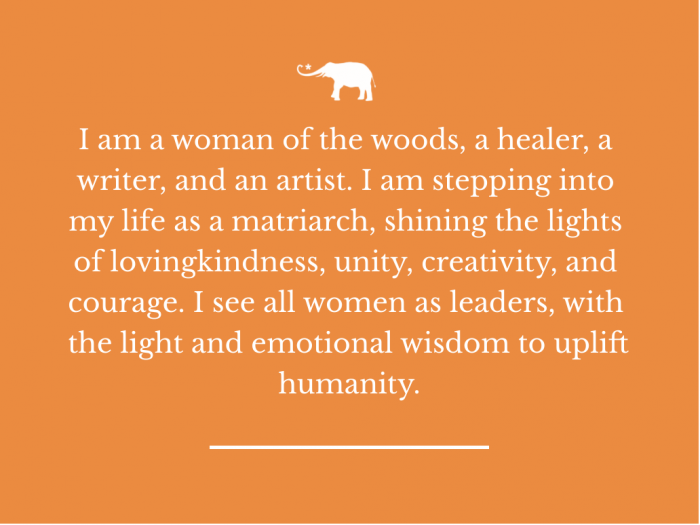What identity will you claim in the second half of life?
Do you know how we make ideas sound good, even if they’re bad?
By repeating them over and over.
Repetition is a basic tool of persuasion, even of propaganda. The argument doesn’t even have to be sound. But repetition can start a movement. And a movement can draw in people until we finally accept a concept without thinking about it. I believe that one bad idea, movement, and accepted concept for women is to embrace the archetype “crone” as our projected future.
I was beginning to feel that to be a modern, hip, older female, I should welcome in the crone—that image of the bent over, darkly clothed, menacing hag. The Merriam-Webster Dictionary defines the crone as a cruel or ugly old woman. After that lovely definition, they offer us this example of the term used in a sentence: chocolate-colored rock formations that look like giant toadstools, fat old crones, and creatures from a bad dream. That is not an image that I want to empower in my life.
On the website Vocabulary.com, under an equally disparaging definition of the crone, they give this explanation:
“Since the late fourteenth century, the word crone has been a term of abuse describing old and bad-tempered women. It traces back to the Anglo-French word charoine, meaning ‘dead flesh.’ Most people don’t like being described as dead flesh…”
Wow, that’s disgusting!
The Cambridge Dictionary gives us this “lovely” list of related words:
>> bag
>> battle-ax
>> besom
>> b*tch
>> cow
>> dog
>> dragon
>> fishwife
>> hag
>> harpy
>> harridan
>> misandrist
>> she-devil
>> shrew
>> shrewish
>> termagant
>> trout
>> virago
>> vixen
Although I kind of like “vixen,” I am not embracing any of the others!
When I passed these definitions by my husband, he mused about what the male equivalent to crone was, and came up with “geezer.” He wasn’t having any of that. And when I looked up the male equivalent of the crone, I found wizard, time lord, codger, warlock, and sage. The only word that is kind of negative is “codger.” In searching for images of codger, I found there were none. There are plenty of pictures of the haggard old crone, though.
Seriously, we don’t need to perpetuate this negative view of women.
Some Jungian theorists claim that the word crone has a positive connotation—that it comes from the word crown. But the crone isn’t portrayed positively in any of our modern fairy tales, dictionary definitions, or Google searches. Why do we have to embrace this word? This imagery?
Our imagery of who we can become means everything to our future health and happiness—and how we’re perceived by others. If the law of abundance—which says that the images and ideas of ourselves that we hold in our minds are projections of what we want our lives to be—is indeed acting upon our future, the image of the crone is not in our best interest.
Are you sure that you want to take on the image of the crone? Bent over with severe scoliosis, unchecked rheumatoid arthritis, and maybe even severe osteoporosis?
Embittered, she knows that her decay came from years of taking care of others. Society told her that this was her holy sacrifice. She sorely neglected herself until she was thoroughly spent. Her anger and cruelty are the result of years of emotional neglect and trauma. No, ladies: let’s work through that sh*t!
Her inclination to curse and create fear in those she meets comes from years of loneliness that served as the foundation for her inability to form loving relationships. This is sad beyond measure.
Her dark clothing implies that she is in a constant state of mourning for a life of disappointment and regrets. This is not the spiritual path of a wise woman. A wise woman knows that mourning is living in the past.
This negative image is not me.
Ladies, if we want to take back the power of the second half of life in our western society, we need to write it from our perspective. If we look back to ancient traditions, the wise woman we are looking for was the bearer of life in the first half and the healer in the second half. We need to take back how our female ancestors took care of themselves and their families. We need to see ourselves from the perspective of the leader and healer.
In that first part of our life, we have immense creative force. After all, we manage hormones strong enough to create human life! Our years of managing that energy have left us powerful beyond measure. Now we need to lead the younger generation to a bright future. They have enough to contend with. They need us to help them enter their own second half with positive mentoring from us.
We don’t have to do anything but be lively, loving examples of living our purpose. We should be shouting from the mountaintops and announcing to the multitudes that on the other side of the hormones that made it possible to create human life is freedom!
If we want society to value us, we need to value ourselves first:
- Let go of the negative connotation of aging, and repeat to yourself over and over again, “I am valued and I am needed.”
- Don’t let the media define you. Seek out inspiring women who will serve as your model and example of power in the second half of life.
- Design your life from your own value system, and live boldly in that place.
- Take deep care of your body, your mind, and your emotions. Our mind and body are the tools that we have been given to experience this life; don’t leave them to the whims of others.
Let’s replace the image of the “crone” with the image of the great goddess. Or the elder. Elder sounds empowering. Loving matriarch—amazing. I will happily take on wise woman, too.
I am a woman of the woods, a healer, a writer, and an artist. I am stepping into my life as a matriarch, shining the lights of loving-kindness, unity, creativity, and courage. I see all women as leaders, with the light and emotional wisdom to uplift humanity.
What name or description will you claim in the second half of your life? What is the visual that you have for all women in the second half of life? You claim it. You design it. You decide!













Read 90 comments and reply